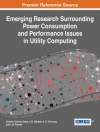Decision makers in the Renewable Energy sector face an increasingly complex social, economic, technological, and environmental scenario in their decision process. Different groups of decision-makers become involved in the process, each group bringing along different criteria therefore, policy formulation for fossil fuel substitution by Renewable Energies must be addressed in a multi-criteria context. Multi Criteria Analysis in the Renewable Energy Industry is a direct response to the increasing interest in the Renewable Energy industry which can be seen as an important remedy to many environmental problems that the world faces today. The multiplicity of criteria and the increasingly complex social, economic, technological, and environmental scenario makes multi-criteria analysis a valuable tool in the decision-making process for fossil fuel substitution.
The detailed chapters explore the use of the Multi-criteria decision-making methods and how they provide valuable assistance in reaching equitable and acceptable solutions in the selection of renewable energy projects. Common multi-criteria decision-making methods including Analytical Hierarchy Process, PROMETHEE, ELECTRE, TOPSIS and VIKOR are explored in detail with an application case of each method included at the end of each chapter. As such, Multi Criteria Analysis in the Renewable Energy Industry is an ideal resource for those groups of individuals, institutions and administration such as local authorities, academic institutions, environmental groups, and governments that, through their priorities and evaluation systems, have interests at stake and directly or indirectly influence the decision-making process.
Cuprins
1. The Renewable Energy industry and the need for a Multi-criteria analysis.- 2. Multi-criteria Analysis.- 3. AHP.- 4.Weighted Sum Method and Weighted Product Method.- 5. PROMETHEE.- 6. ELECTRE.- 7. TOPSIS.- 8. VIKOR.- 9. A Multi-criteria Data Envelopment Analysis.- 10. Multi Attribute Utility theory.- 11. Fuzzy PROMETHEE.- 12. FAHP.- 13. The Shapley value.
Despre autor
Dr San Cristóbal has been a teacher at the University of Cantabria, Spain, since 1998. He obtained his Ph D in 2004. His area of work is economics (input/output) and management science/operations research in general, applied to several fields. His research has focused on fields such as input/output and natural resources; investment criteria and cogeneration plants; linear programming models and environment; multi-criteria analysis in renewable energies; and multi-objective programming models in project management.












